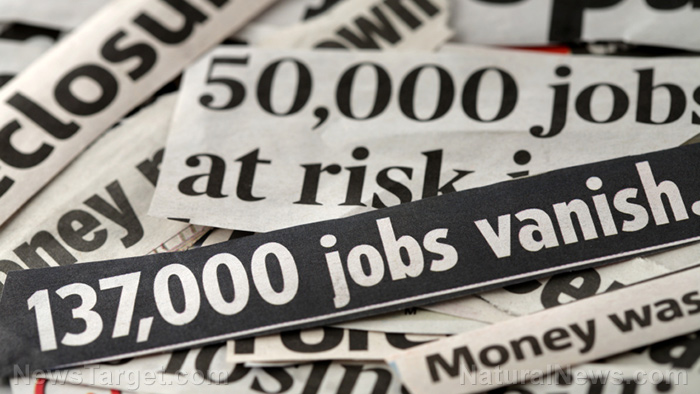America in 2024: Fast food is a “luxury”, 11 million children live in poverty, and 1000s of stores are closing
05/28/2024 / By News Editors

Little by little, our standard of living has been eroding. A couple decades ago, we had the largest and most prosperous middle class in the history of the world, but now most of the country is struggling. At this point, fast food is considered to be a “luxury”, 11 million children are living in poverty, and thousands of stores are permanently shutting down all over the United States because consumers have so little discretionary income these days. We are in the midst of a historic cost of living crisis, and those at the bottom of the economic food chain are being hit the hardest.
(Article by Michael republished from TheEconomicCollapseBlog.com)
The ultra-wealthy don’t really care that food costs have been soaring, but for those that are barely scraping by from month to month it makes an enormous difference.
Once upon a time, fast food restaurants were where those that were struggling went to eat.
But now fast food is considered to be a “luxury” in 2024, and that is because fast food prices have gone absolutely haywire…
A Big Mac sandwich at McDonald’s, for example, cost $3.99 in 2019. Now, that price has more than doubled to $8.29, according to Fast Food Menu Prices, an online tracker.
Gone, too, are the days of the $5 Footlong at Subway. A BLT Footlong that cost $5.50 in 2019 now costs customers $8.49 in 2024, though prices can vary by location. Additionally, Chipotle’s beloved chicken burrito that cost $6.50 in 2019 now runs customers $10.70.
Fast-food executives have pointed to rising wages and increased costs for ingredients as factors driving up the prices on their menus.
I am sitting here looking at those numbers and I still can’t wrap my head around them.
I never imagined that I would see the day when it took more than 8 dollars to buy a Big Mac.
That is insane!
A different survey that was recently conducted by Lending Tree discovered that almost 80 percent of all Americans believe that fast food is a “luxury item” now…
Nearly 80 percent of Americans now consider fast food to be a “luxury item” as families feel the squeeze from the Biden regime’s failing economy.
According to a survey from Lending Tree of around 2,000 adults, what was once considered an affordable option for low-income workers is fast becoming the opposite.
Meanwhile, the number of American children living in poverty continues to increase with each passing day.
If you can believe it, we are being told that over 11 million U.S. children are now living in poverty…
More than 11 million children were estimated to be living in poverty in 2021, according to U.S. Census Bureau data published by the Children’s Defense Fund.
That equates to around one in seven children in the U.S., or 15.3 percent. It’s a high toll, and one even higher than the adult population, which was 10.5 percent for 19-64 year olds that year and 10.3 percent for adults aged 65+.
According to an analysis by the Peter G. Peterson Foundation, this difference is due to factors such as the “cost of caregiving and its responsibilities, transitions to a single parenthood household, unemployment of parents, and disabilities of family members.”
Today, approximately 40 percent of the entire country is considered to be either living in poverty or among the ranks of “the working poor”, and 42 million Americans are on food stamps.
We now have an absolutely gigantic “underclass” that is largely made up of people that were once solidly middle class.
The rapidly rising cost of living is just shredding families from coast to coast.
In Montana, one senior is incredibly frustrated because his property taxes have increased by 790 percent over the past several years…
A senior from Montana has delivered a viral speech about the sorry state of property taxes in the Treasure State.
“I’m on Social Security, I’m 68-years-old and working just to pay my taxes,” says Kurt, in a clip shared on TikTok by Ryan Busse, who is running to be the next governor of Montana.
Kurt claims that over the last couple of years, his annual property taxes have soared from $895 to almost $8,000 — an increase of around 790% — which he says is like paying almost “$700 a month rent to the state to live in our own house.” The state has an Elderly Homeowner/Renter Tax Credit, and the maximum credit is $1,150.
His property taxes have skyrocketed because property values have skyrocketed.
And property values have skyrocketed because our leaders flooded the system with way too much money.
Small businesses are being monkey-hammered by inflation as well.
In fact, one recent survey found that 86 percent of all U.S. small businesses say that they are being hurt by inflation…
An overwhelming majority of small business owners say they are being hurt by rising prices.
The new survey released Wednesday by small business network Alignable shows 86% reporting being hurt by high costs with only 6% saying they are thriving and not struggling.
Alignable surveyed more than 3,000 business owners from mid-April to mid-May and found that they overwhelmingly lament the burden of inflation.
Dollar stores in particular are being hit really hard by rising costs.
For example, 99 Cents Only has decided to close all of their stores because conditions have changed so dramatically…
For years, dollar stores were a fixture in nearly every strip mall in California, offering cheap household goods, bread and produce, and even toys and gifts.
But if it seems like your favorite dollar store is heading for the exit, you’re not wrong.
2024 may be their swan song.
In April, California-based 99 Cents Only announced it was closing all 371 locations after decades in business. The retailer blamed economic factors, including rising levels of “shrink,” inflation, and shifting consumer demand that has presented “significant and lasting challenges.”
Not to be outdone, Dollar Tree has announced that it will be closing about 1,000 stores…
Dollar Tree, which owns Family Dollar, recently said it will close nearly 1,000 stores. That’s after Dollar Tree raised prices in the past couple of years for the first time in decades.
Overall, so far in 2024 retailers have already announced that they will be closing nearly 3,200 stores, and we haven’t even reached the mid-point of the year yet…
The retail industry is going through a tough time as it copes with inflation-weary consumers and a rash of bankruptcies, prompting chains to announce the closures of almost 3,200 brick-and-mortar stores so far in 2024, according to a new analysis.
That’s a 24% increase from a year ago, according to a report from retail data provider CoreSight, which tracks store closures and openings across the U.S.
The final countdown for the U.S. economy has begun, but most Americans do not even realize what is happening.
Most Americans just assume that our leaders can fix things by printing even more money and that conditions will “return to normal” eventually.
But the truth is that there isn’t going to be a “return to normal”, because this is about as “normal” as things are going to get.
It has taken decades of horrendous decisions to get us to this point, and now we are steamrolling toward economic oblivion.
If you think that our leaders in Washington will be able to turn this ship around, you are just being delusional.
Read more at: TheEconomicCollapseBlog.com
Submit a correction >>
Tagged Under:
Bubble, business, chaos, Collapse, cost of living, crisis, debt bomb, debt collapse, economic riot, economy, famine, fast food, finance, finance riot, food collapse, food inflation, food supply, housing bomb, hunger, market crash, money supply, panic, pensions, poverty, rationing, rising prices, risk, scarcity, starvation, US, Xpost
This article may contain statements that reflect the opinion of the author
RECENT NEWS & ARTICLES
COPYRIGHT © 2017 PENSIONS.NEWS
All content posted on this site is protected under Free Speech. Pensions.news is not responsible for content written by contributing authors. The information on this site is provided for educational and entertainment purposes only. It is not intended as a substitute for professional advice of any kind. Pensions.news assumes no responsibility for the use or misuse of this material. All trademarks, registered trademarks and service marks mentioned on this site are the property of their respective owners.


















